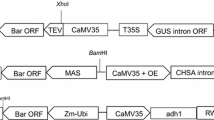Abstract
Transgenic plants of cassava (Manihot esculenta) resistant to the herbicide Basta were obtained through Agrobacterium-mediated transformation. The plants also expressed the uidA gene and two were positive for PCR- and/or Southern-based detection of the nptII gene. Somatic-embryo-derived cotyledons were used as source of explants. A non-disarmed Agrobacterium strain (CIAT 1182) was used to transfer the genes of interest into cassava cultivar MPer183. Greenhouse tests of resistance to Basta (Hoechst) showed three plant lines with different levels of tolerance to the herbicide. Based on Southern tests of transgenesis, the transformation efficiency was 1%. The results constitute the first report of the bar gene conferring herbicide resistance to cassava plants.
Similar content being viewed by others
Author information
Authors and Affiliations
Additional information
Received: 9 January 1999 / Revision received: 10 May 1999 / Accepted: 15 June 1999
Rights and permissions
About this article
Cite this article
Sarria, R., Torres, E., Angel, F. et al. Transgenic plants of cassava (Manihot esculenta) with resistance to Basta obtained by Agrobacterium-mediated transformation. Plant Cell Reports 19, 339–344 (2000). https://doi.org/10.1007/s002990050737
Issue Date:
DOI: https://doi.org/10.1007/s002990050737




